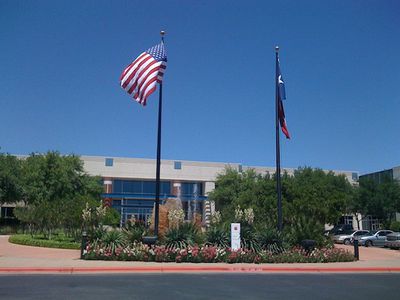Apple Investing $300 Million in Austin, Texas to Add 3,600 More Workers
The State of Texas today announced that Apple has committed to spend $304 million to expand its operations in Austin, seeking to add 3,600 employees to its facilities there.
The new campus will more than double the size of Apple's workforce in Texas over the next decade, supporting the company's growing operations in the Americas with expanded customer support, sales and accounting functions for the region. In exchange for Apple's commitment to create these new jobs in Texas, the state has offered Apple an investment of $21 million over ten years through the Texas Enterprise Fund (TEF).
While Apple's Austin campus focuses primarily on customer support and other administrative functions, it does also house some engineering functions primarily related to chip design.
Samsung's chip factory where it produces Apple's A-series chips for its iOS devices is also located in Austin and recently underwent a major expansion itself to support Apple's products.
Update: The City of Austin has also proposed an $8.6 million grant investment in the project should Apple meet certain performance metrics presumably tied to campus development and hiring. Apple is required to invest $56.5 million in new facilities and equipment by the end of 2015, with an additional $226 million investment coming by the end of 2021. Apple has also committed to retaining its existing 3,100 jobs in Austin and adding at least 3,635 new jobs, with yearly hiring targets for each of the ten years following the opening of its Phase I expansion.
Popular Stories
Apple will launch its new iPhone 17 series in two months, and the iPhone 17 Pro models are expected to get a new design for the rear casing and the camera area. But more significant changes to the lineup are not expected until next year, when the iPhone 18 models arrive.
If you're thinking of trading in your iPhone for this year's latest, consider the following features rumored to be coming...
A new Apple TV is expected to be released later this year, and a handful of new features and changes have been rumored for the device.
Below, we recap what to expect from the next Apple TV, according to rumors.
Rumors
Faster Wi-Fi Support
The next Apple TV will be equipped with Apple's own combined Wi-Fi and Bluetooth chip, according to Bloomberg's Mark Gurman. He said the chip supports ...
Apple's next-generation iPhone 17 Pro and iPhone 17 Pro Max are only two months away, and there are plenty of rumors about the devices.
Below, we recap key changes rumored for the iPhone 17 Pro models.
Latest Rumors
These rumors surfaced in June and July:A redesigned Dynamic Island: It has been rumored that all iPhone 17 models will have a redesigned Dynamic Island interface — it might ...
Apple does not plan to refresh any Macs with updated M5 chips in 2025, according to Bloomberg's Mark Gurman. Updated MacBook Air and MacBook Pro models are now planned for the first half of 2026.
Gurman previously said that Apple would debut the M5 MacBook Pro models in late 2025, but his newest report suggests that Apple is "considering" pushing them back to 2026. Apple is now said to be...
iPhone 17 Pro and iPhone 17 Pro Max models with displays made by BOE will be sold exclusively in China, according to a new report.
Last week, it emerged that Chinese display manufacturer BOE was aggressively ramping up its OLED production capacity for future iPhone models as part of a plan to recapture a major role in Apple's supply chain.
Now, tech news aggregator Jukan Choi reports...
The long wait for an Apple Watch Ultra 3 is nearly over, and a handful of new features and changes have been rumored for the device.
Below, we recap what to expect from the Apple Watch Ultra 3:Satellite connectivity for sending and receiving text messages when Wi-Fi and cellular coverage is unavailable
5G support, up from LTE on the Apple Watch Ultra 2
Likely a wide-angle OLED display that ...
In select U.S. states, residents can add their driver's license or state ID to the Wallet app on the iPhone and Apple Watch, providing a convenient and contactless way to display proof of identity or age at select airports and businesses, and in select apps.
Unfortunately, this feature continues to roll out very slowly since it was announced in 2021, with only nine U.S. states, Puerto Rico,...
The iPhone 17 and iPhone 17 Air will be available in a total of nine color options, according to new information coming out of Asia.
The iPhone 17 Air's expected color options.
According to the leaker going by the account name "yeux1122" on the Korean blog Naver, accessory manufacturers are now producing camera protector rings for the iPhone 17 and iPhone 17 Air in colors to match their...





















